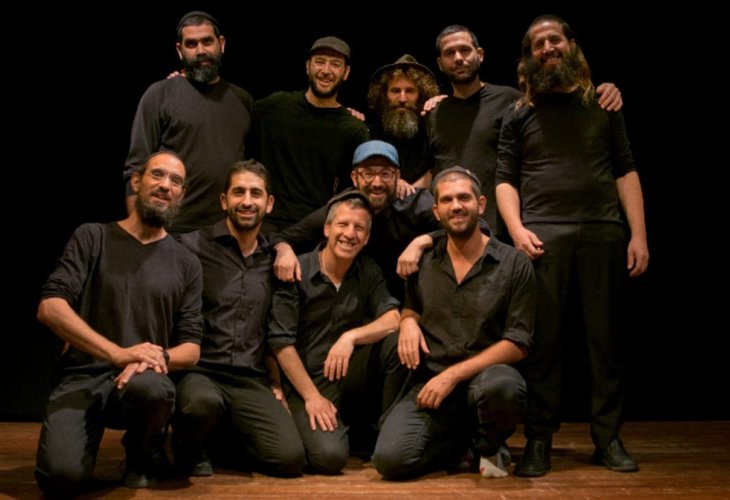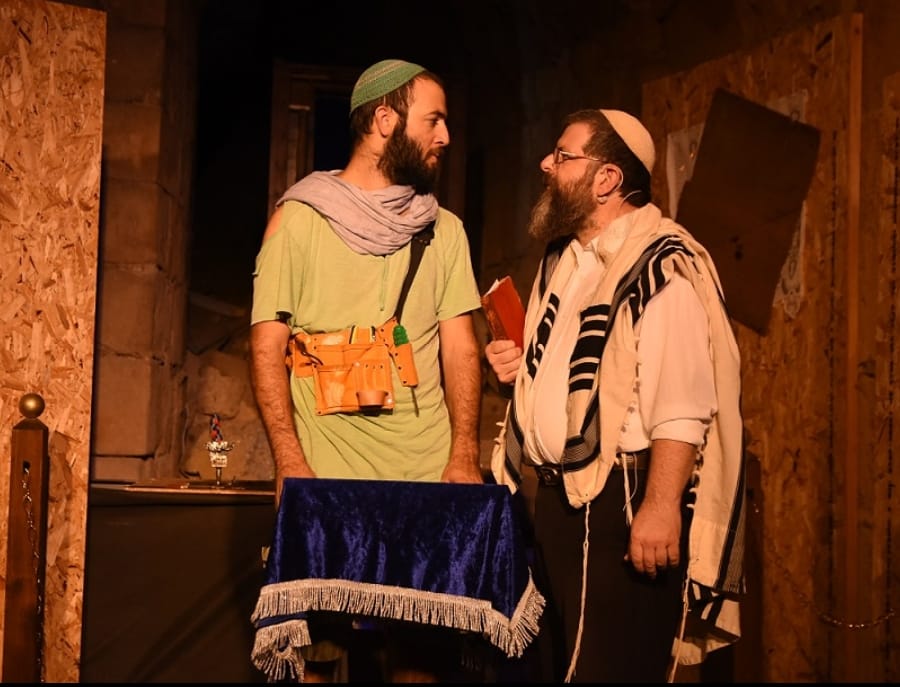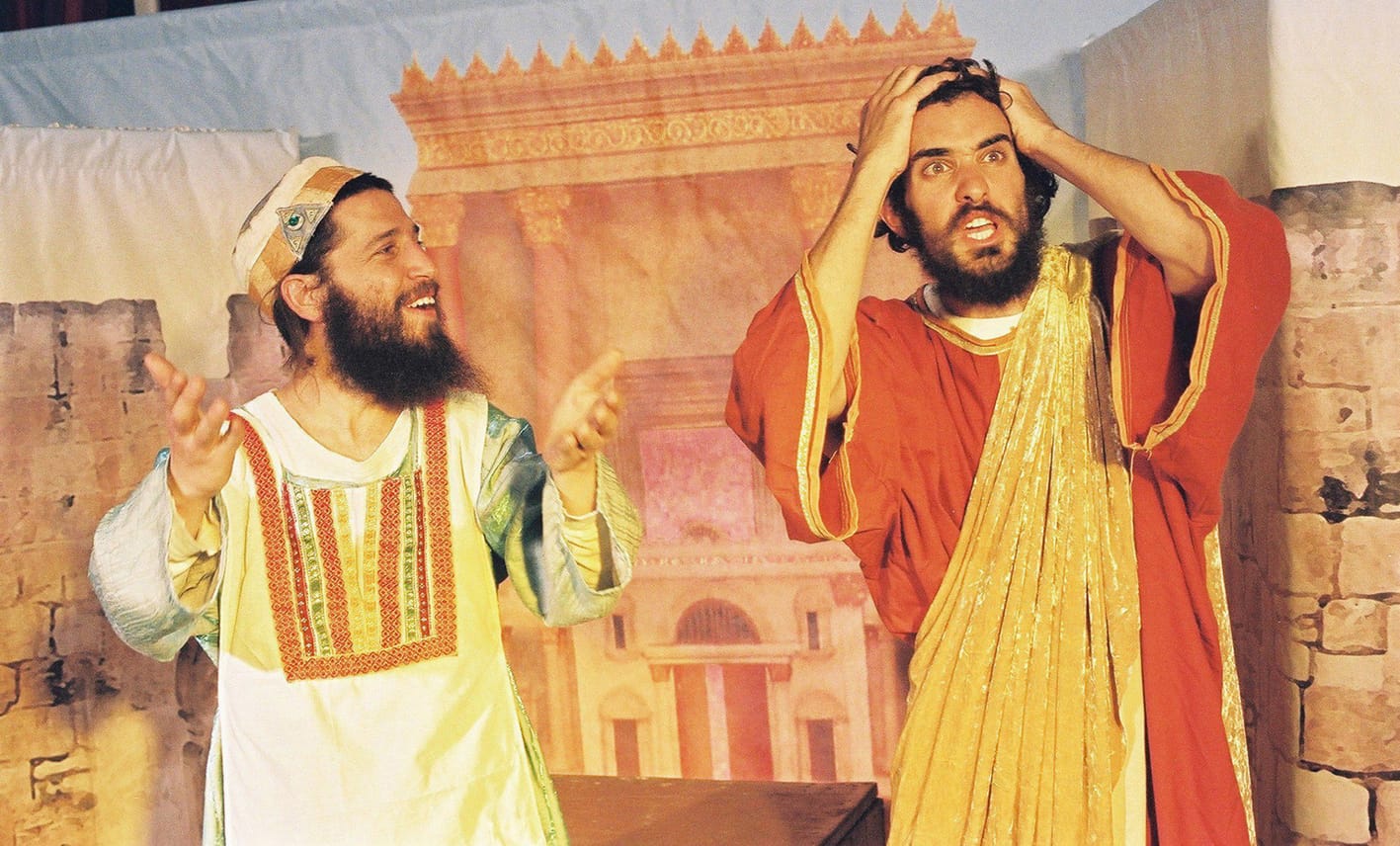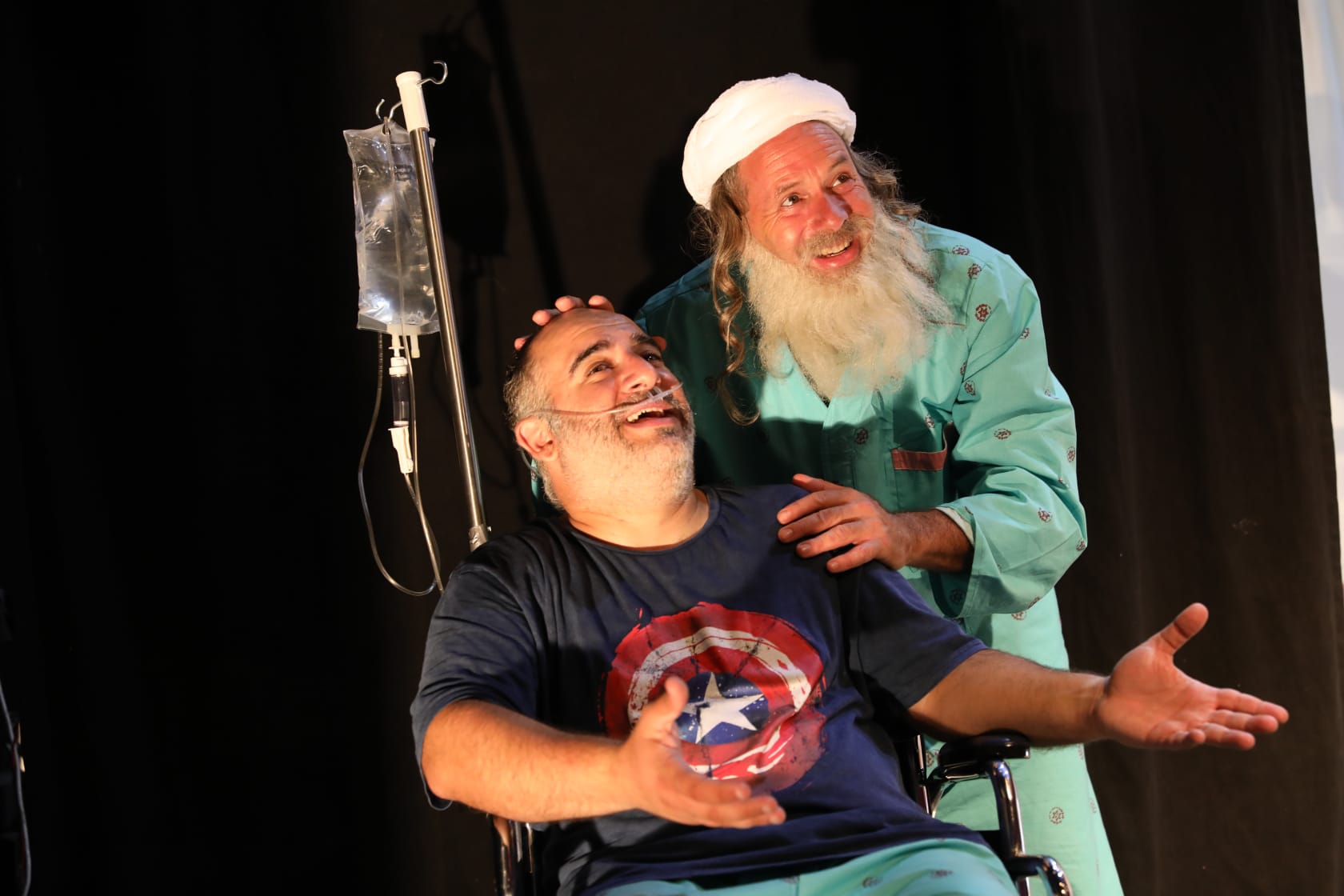The Kibbutz Child and the Boy Who Dreamed of Becoming a Monk: Famous Actors in a Touching Life Story
Omri Veretsh grew up on a kibbutz without any knowledge of Judaism, while Amichai Chazan rebelled against his religious upbringing and wanted to become a Tibetan monk. Miraculously, their paths crossed, they returned to Judaism, and together they founded the 'Good Point' theater, spreading goodness across the country.

When Omri Veretsh founded the 'Good Point' theater 20 years ago, he didn't anticipate how many hearts he would draw closer through theater. Amichai Chazan, now his theater partner, also didn't imagine that the small theater would grow and expand, performing across the country for diverse audiences.
But honestly, if you had told either of them in their youth that they would perform in plays filled with Jewish messages, with a vision to expose audiences to messages of Judaism and faith, they would have thought you were delusional.
Both came from backgrounds far removed from Judaism, each undertaking a miraculous journey under divine providence that led them to the theater and what they see as their life's mission. These days, between performances across the country and writing a new show, we met them for an intriguing conversation where they share their stories.
From Kibbutz to Hasidism
"I was born in Kibbutz Ruhama of Hashomer Hatzair in the south," recounts Omri, "At 16, I left the kibbutz with my parents, experiencing a major crisis because the kibbutz was my entire world and I knew nothing else. I moved to study in Kfar Saba but didn't find my place in the city, so I went to study theater in Mitzpe Ramon, but didn't finish my studies, perhaps due to attention and focus issues, or in my case - attention and dance."
Omri didn't complete his studies, but that didn't stop him from performing on large stages, moving to Tel Aviv, and becoming a well-known actor. Shortly after, he received an invitation to join a unique group in Italy focused on 'modern theater.' "The initiator of this group is one of the world's famous directors," explains Omri, "and it was very flattering that he invited me to join him. Besides me, there were six other actors in the group from different countries around the world, one of whom was Pakistani. We became an international theater performing in English and French. Our theater was based on the idea that the actor should lead the plot, which we did in combination with spiritual work that included ancient songs, yoga-related headstands, and other physical exercises."
Then, there in Italy, far from anything Jewish, Omri suddenly began to feel a desire to get closer to religion. "I felt very spiritual sensations of closeness to Hashem," he describes, "something in my heart awakened, I very much wanted to keep Shabbat and kosher, but didn't know how."
When Omri talks about this, he still sounds amazed. "There's no logical explanation," he says, as an Ashkenazi kibbutznik, I hadn't seen tefillin before, and for the bar mitzvah, I received a bicycle. I didn't know what Shabbat was or how to keep kosher. What in the world could drive me to such closeness to Hashem? I have no explanation."
Since he had no one to ask at the time, Omri tried to do what he knew. "Every Friday night I lit candles, not knowing when it was customary to light or what to bless. I avoided eating non-kosher meat, but had no idea about true kosher observance. One day I happened to talk to our theater director about my spiritual desires. Surprisingly, he listened intently, and then asked me: 'Do you know why Jews pray like this?' demonstrating a Jewish praying posture, then added: 'It's because it's like a candle, and that's what characterizes a Jew – spreading light, not because of the exterior, but because of the interior.' Then he turned and said to me: 'Don't try to observe commandments externally; search for your roots,' he also gave me as a gift the first book I read on Judaism - 'Stories of the Baal Shem Tov.'"
At 20, the theater group Omri belonged to disbanded. He decided to continue to New York to instruct actors in this method, but didn't feel fulfilled, so after a short while, he returned to Israel. "I was undergoing a major spiritual awakening," he shares, "and felt more than anything else, I wanted to get closer and understand my purpose in the world. This led me to study Hasidism, especially Breslov Hasidism. I progressed further and further into the world of repentance, a process ongoing to this day.
"During those days, I also met a great Jerusalem tzadik – Rabbi Asher Freund, who greatly influenced my life and guided me along the way. One day he asked me what I was doing, and I answered: 'theater.' At that moment, he jumped up and declared: 'Do it and don't be ashamed.' Thanks to him, I realized that even though I had returned to religious observance, I could continue with my professional occupation. It was a novelty for me because, until then, I hadn't performed for a long time, as I felt I had to give up everything I knew and loved to do. Only after he told me these things did I understand that theater is exactly my mission."
The Tibetan Monk's Dream
Amichai Chazan also underwent an intriguing life journey before arriving at the world of Judaism. Unlike Omri, he actually grew up in a religious-nationalist family, but at 17, he experienced a crisis of identity. "Questions arose within me that deeply occupied me," he explains, "I felt that the commandments and halachot were limiting me, and when I tried to explore, I didn't find answers. During those days, as part of my investigations, I read about various Eastern teachings and felt drawn to them. I read many books on Eastern religions and especially Buddhism, dreaming of the moment I could go to a monastery, disconnect from everything, and do meditations all day until I reach a great spiritual enlightenment. It was very appealing to me, in contrast to Judaism which seemed technical and dry at that time. Unfortunately, I didn't feel the spiritual roots it had, concluding that the path I was educated in no longer suited me."
The search journey, which initially was cautious, quickly turned into great rebellion. "I took off my kippah and changed my name to 'Lotus' - the name of a plant," Amichai shares, "I continued to read a lot about spirituality and planned the day I would fly to a monastery at the edge of a mountain in Tibet. Meanwhile, I also greatly developed my interests in art, painting, theater, and music. I completely left regular studies and only stayed for music and Jewish thought classes, which I connected to. During other times of the day, I roamed Jerusalem's forests, meditated, and studied painting and art at the university and the Bezalel School of Arts."
 From the play 'Tikun Chatzot' Photo: Oshri Cohen
From the play 'Tikun Chatzot' Photo: Oshri CohenWhen Amichai reached conscription age, he wanted to leave the country and realize dreams afar, but his sister persuaded him to stay, making it clear: "You can regret it at any stage." "I stayed in the country and went through challenging years in the army," he recounts, "I felt great emptiness, constantly wandering and thoughtful, not feeling I belonged anywhere. Until one day, with divine assistance, I met a precious Jewish baal teshuva who held a special weekly evening with songs, melodies, and stories. After attending his event several times, I felt it was exactly what I had been searching for. Thanks to him, I connected to Hashem not through questions and answers, but through real and deep belief. I felt I had found what I had been looking for all my life, and after two years of emptiness and pain, I finally returned to observance."
Amichai emphasizes that it didn't happen in an instant, but step by step, with many conversations and self-work, he came to understand that the Torah's halachot detailed weren't meant to burden but were based on sacred foundations. "I realized the most important thing – a person sitting in a monastery trying to cleanse himself from worldly matters is essentially lying to himself because he refrains from influencing the world. Only a person who marries, establishes a home, and raises the next generation impacts the world in the most significant way."
The Aspiration: To Spread Good
The paths of Omri and Amichai crossed shortly after they began strengthening their faith. Omri then lived in the settlement of Itamar, while Amichai was a hilltop youth. "Amichai approached me and urged me to put on a joint play," Omri recalls, "and so we came out with our first show aimed at the children of Samaria. We quickly developed, and after guidance from Rabbi Asher, I felt the sky truly opened, and we had great success. We produced children's plays one after another, all with messages and lots of Judaism. We've been putting on these plays all over the country for twenty years, and in recent years we've added shows for adults and teenagers. Personally, I feel it's a real mission because through theater, one can talk about almost any subject and convey content and messages. Additionally, in recent years we have been offering 'Returning Light Theater' – playback theater where we invite people from the audience to tell their life stories, which we present spontaneously."
 Amichai and Omri in the shows. Photo: Oshri Cohen
Amichai and Omri in the shows. Photo: Oshri Cohen Photo: Oshri Cohen
Photo: Oshri CohenAs someone who writes, directs, and acts in the plays, do you feel there are things you have to give up due to being observant?
"Not at all. I don't give up anything professionally; rather, I even engage in much more meaningful things. Because our theater doesn't just bring stories and performances, but really tries to present things pertaining to the Jewish soul and the rectification of the world and character. I ensure not to gloss over, and in our performances, you can encounter talks about crises and challenges. I strive to convey messages of faith through theater, and faith is not always in the light; often it is in darkness. I feel a great privilege that all these messages pass through me, but at the same time, it's clear to me that I'm not the one managing the theater but just the messenger."
And Amichai adds: "In the period when I was far from observance, I felt what I missed most was the heart and experience in the commandments. This is exactly what I try to convey as much as possible through theater. That's how our plays were born, like the recent 'Happiest Moment of My Life' show, which tells the story of Lior Shay, a dear Jew who always said, 'This is the happiest moment of my life,' even in tough times when he was ill and knew his days were numbered. We also have a play about Rabbi Aharon Margalit, author of the book 'And I Will Walk' that speaks a lot about faith and connects hearts to prayers and the Jewish heart, as well as other plays on various topics."
 A scene from the show - Happiest Moment of My Life. Photo: Daniel Levy
A scene from the show - Happiest Moment of My Life. Photo: Daniel Levy Photo: Daniel Levy
Photo: Daniel LevyHe is also certain that theater is his life's mission. "I look at the young man I was 25 years ago, when I didn't dream of building a family and observing commandments, and now, when I pray Shabbat prayers surrounded by my children, I feel such immense satisfaction, and I feel it is truly a duty to enable others to live lives full of light thanks to the Torah and halacha."

